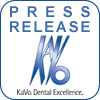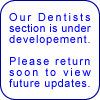| These FAQ and Answers
have been complied by KaVo and the Pathfinder Dentists.
Current research is being carried out on aspects of
treatment and we hope to update the site with latest
findings as soon as we are able to. Many of the answers
are compiled from the experiences of current users and
are anecdotal.
Please submit your questions
to our site and we will be happy to answer as soon as
we are able and post them onto our site.
Credit is given to all pathfinder dentists and to KaVo
who contributed to the completion of this feedback form.
Questions and Answers on Ozone?
Please click here to
take you to our Ozone section
- Is there a device available that can read
ozone output?
Yes, there is a specialist piece of equipment that
can read ozone output but it is a very high investment.
- How can variable penetration of ozone be
controlled and what studies are there to support this?
There is no current data to confirm that this is possible.
- How do I know that my unit is producing
Ozone?
It is very important to have regular maintenance.
A simple clinical tip is to ozonate a latex glove
for 5 seconds, if ozone is being generated the glove
will disintegrate.
Treatment and Technique
Queries
- What applications can HealOzone be used
for?
The current recommended uses are for pit, fissure
and root caries. Further research is being carried
out on other aspects including Root Canal Treatment,
Tooth whitening and Periodontology. Early results
are very encouraging.
- What is the best way to diagnose and record
lesions?
Use Clinical observation and record using CSI (Clinical
Severity Index), Use Diagnodent Values (DV) and Dental
radiographs. Intraoral Camera Images may be captured
and stored using appropriate Dental database software.
- What cavity types are being treated with
HealOzone?
Some users are treating lesions of all types and sizes.
See Treatment section.
- Which of these applications already has
clinical research to support it?
Single surface lesions. Root lesions and occlusal
lesions. See our Research section.
- Is there a protocol for the use of the
Diagnodent within the HealOzone studies, i.e. the
levels of the Diagnodent reading and at what level
ozone will be effective?
Yes, please visit our treatment section for an explanation.
(Abbr. DV =Diagnodent Values).
- What techniques if any are being used for
treatment of interproximal lesions?
Tunnel preparation or open using air abrasion. See
our Treatment section.
- Should ozone cavities be temporised? If
so does this slow down healing?
Large cavities that will be difficult to clean should
be temporized. Fuji
7 from GC UK is a suitable material as it will
promote Remineralisation (See Fuji
7 on our site).
- What areas of treatment do not appear to
be successful?
Lesions with a Diagnodent value of DV>98. Diagnodent
maximum readings are 99. Lesions above this reading
can be of any size.
- What is the average ozone application time?
The average ozone application time being used should
be 40-60 seconds.
- What is the best way of accurately establishing
efficacy of this treatment in practice, as the Diagnodent
is excellent at diagnosing, but appears to be less
useful in monitoring?
Use with clinical observation, e.g. CSI. The primary
outcome variable must be 'clinical reversal of caries.
- When treating open cavities, how important
is the patient plaque control?
Very, the lesion must be plaque free to allow the
process of re-mineralisation to take place. Fuji
7 can be used to seal Ozonated cavities.
- How quickly will acidogenic plaque re-form
and would any kind of provisional filling be useful?
It will take more than 6-8 weeks, but the use of Fuji
7 has been found to be very successful by some
of the Pathfinders.
 |
Users Queries
- How can you accurately confirm that a lesion
has been arrested?
Use CSI and DV (Diagnodent values).
- Can the application times of Ozone onto
a lesion be improved?
Yes, this has now been done. KaVo have updated the
Healozone to incorporate a foot control as well as
an increased delivery time.
- How long do you need to wait before finding
evidence that lesions are arresting/reversing?
About 4-8weeks, depending on lesion type and the degree
of access/ cleansing. Please refer to our Healozone
Concept section.
- When is it safe to assume that no further
treatment is required?
When the DV falls. Covering with Fuji7 is also advantageous.
Other Applications
- Are there any studies supporting the use
of HealOzone to reduce sensitivity?
There are no existing studies available. Some practitioners
have demonstrated success. The current advice is that
Healzone should not be purchased for the treatment
of Cervical sensitivity alone.
- Why does ozone treatment affect sensitivity?
It opens the channels, allowing minerals to flood
into channels, blocking pores, so sensitivity ceases.
- Is HealOzone being used as part of Endodontic
treatment, including root canals? If so, is it a benefit?
As an effective disinfectant. Current research attaches
a fine “nozzle” within the sealant cup
and allows delivery of ozone into the canals. Ozone
will therefore destroy bacteria within the infected
system.
- What beneficial effects have been found
for the use of ozone on ulcers, if it is a benefit
what type of ulcer can be treated?
Most ulcers seem to get better.
- What use does ozone have for the treatment
of dry sockets?
Dry socket is a bio-film problem and therefore there
is no reason why it should not be treated by ozone.
- If dentine has been literally denatured,
how can one get re-mineralisation?
Mineral will penetrate the organic component.
- How can one tell whether the enamel porosity
above lesions is sufficient to allow ozone penetration?
You should be able to tell by the Diagnodent reading.
 |
Patient Related
- What, if any, possible future health risks
are there to patients, which may be caused by ozone
treatment?
None, provided equipment is well maintained, which
includes 6 monthly services, to ensure ozone is being
produced at the correct levels.
- What adverse reactions to treatment are
occurring, if any?
None have been noted at to date.
- Are any of the patients experiencing pain
after ozone treatment?
No patients have experienced any pain as a result
of Ozone treatment.
- How do you feel about the use of HealOzone
for the possible reversal of Pulpitis?
Bacterial inactivation with ozone seems to help reverse
Pulpitis. There has been success with patients who
have had pain from deep lesions. Some have failed.
It would seem that the success is dependant on amount
pulpal damage (too much inflammatory vasoconstriction
for too long, or micro-leakage allowing the new bacteria
to continue the inflammatory process).
Research Questions
- What statistical information is there to
show the length of time it takes for lesions to arrest
/reverse?
Statistics show that it takes an average of 6-8 weeks
for reversal.
Patient Information
/ Marketing
- What is the average fee scale?
Approximately £35.00 per tooth, maximum £295.00
for full mouth. Many Pathfinders appear to be charging
the same price as a standard composite.
- Should you give every patient a patient
kit?
Yes. The re-mineralisation aspect is very important.
The kit increases the success levels of the treatment
by enhancing mineral uptake and ensuring good oral
hygiene practice.
- If so, is a patient kit included in the
price in the fee or charge separately?
The uptake is better when the kit is included within
the price of the treatment.
|




